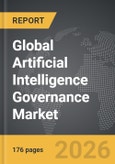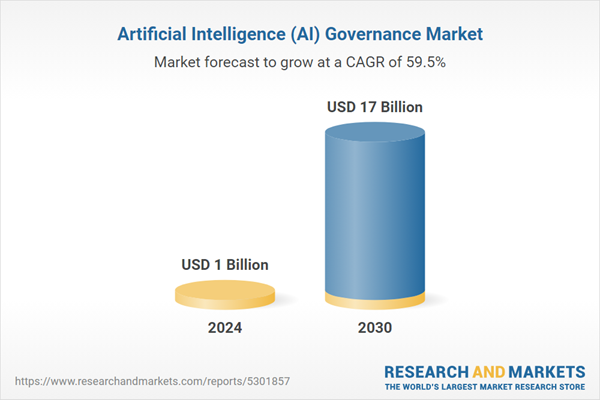Global Artificial Intelligence (AI) Governance Market - Key Trends and Drivers Summarized
What is AI Governance, and Why is it Essential?
AI governance refers to the frameworks, policies, and practices that guide the ethical development, deployment, and regulation of artificial intelligence systems. As AI technologies continue to permeate various aspects of society, from healthcare and finance to law enforcement and education, the need for comprehensive governance has become increasingly critical. AI systems, particularly those that leverage machine learning, handle massive amounts of data, making them capable of significant impact, both positive and negative. However, without clear standards and regulatory oversight, AI applications may lead to unintended consequences, such as biased decision-making, privacy breaches, and even ethical transgressions. Governance in AI aims to address these risks by establishing transparent guidelines on data usage, accountability, and decision-making processes. By creating a robust governance framework, stakeholders can ensure that AI technologies are developed and used in a way that aligns with societal values, minimizes harm, and promotes fairness, accountability, and transparency. Thus, AI governance is essential not only for mitigating risks but also for fostering public trust in AI systems, enabling their responsible integration into society.How Are AI Governance Frameworks Being Developed Worldwide?
Governments, industry bodies, and academic institutions across the globe are actively working to develop AI governance frameworks tailored to the unique challenges posed by AI. In Europe, for example, the European Union’s General Data Protection Regulation (GDPR) has laid the groundwork for data privacy standards, influencing AI policies with a strong emphasis on protecting user data. Building on this, the EU introduced the Artificial Intelligence Act, which seeks to categorize AI systems based on risk and regulate high-risk applications with stringent requirements on transparency, accountability, and human oversight. In the United States, AI governance is currently decentralized, with initiatives led by federal and state agencies. However, regulatory bodies like the National Institute of Standards and Technology (NIST) are establishing voluntary guidelines to help companies navigate ethical and secure AI deployment. In Asia, countries such as Japan and Singapore are advancing AI governance by promoting international collaboration and focusing on the safe integration of AI into public services. The United Nations and the OECD have also developed global principles that emphasize fairness, transparency, and human rights in AI. These varied frameworks demonstrate that AI governance is not a one-size-fits-all approach; rather, it requires a balance between local regulatory needs and global cooperation to address the universal ethical challenges posed by AI technologies.What Are the Key Challenges in Governing AI Effectively?
Governing AI presents unique challenges due to the complexity, autonomy, and rapid evolution of AI systems, which often outpace traditional regulatory approaches. One of the foremost challenges is ensuring accountability in AI decision-making, especially when algorithms operate in a black-box manner, where even developers may struggle to understand how specific decisions are made. This lack of transparency makes it difficult to pinpoint responsibility when AI errors occur or when an AI system produces biased or unfair outcomes. Another critical issue in AI governance is the potential for algorithmic bias, where data-driven AI models unintentionally perpetuate or amplify existing social biases, resulting in discriminatory practices. Data privacy is an additional concern, as AI models frequently rely on vast amounts of personal data to learn and improve, raising questions about consent, data protection, and individual privacy rights. There is also a challenge in balancing innovation with regulation, as overly restrictive policies may stifle technological progress while lenient regulations could lead to irresponsible AI applications. Lastly, the global nature of AI requires international cooperation and consensus on governance principles, which can be difficult to achieve given differing cultural, legal, and ethical perspectives. Addressing these challenges requires adaptable, interdisciplinary, and collaborative governance frameworks that can evolve alongside AI technologies to ensure they remain safe, fair, and beneficial.What Factors Are Driving the Growth and Urgency of AI Governance?
The growth in AI governance is driven by multiple factors, reflecting the widespread integration of AI into critical societal functions and the potential risks associated with unchecked AI development. Firstly, the increasing adoption of AI in sensitive sectors such as healthcare, criminal justice, and finance has highlighted the need for strict governance to prevent harmful biases and ensure ethical decision-making. These sectors have a direct impact on individuals’ lives, making responsible AI deployment essential to protect rights and maintain public confidence. Secondly, high-profile incidents of AI failures, such as facial recognition inaccuracies and discriminatory hiring algorithms, have intensified public demand for accountability and transparency in AI systems. This demand has spurred governments and organizations to act quickly to establish policies that hold AI systems to ethical standards. Technological advancements, especially in machine learning and autonomous systems, have also accelerated the urgency for governance, as AI systems become more complex, autonomous, and capable of decision-making without human oversight. The growth of global data privacy regulations, such as GDPR, has also set a precedent, pressuring other regions to adopt similar standards that govern AI data handling practices. Lastly, the race among countries to lead in AI innovation has driven the need for governance to strike a balance between fostering technological progress and ensuring ethical integrity. Together, these factors are propelling the growth of AI governance, underlining its critical role in shaping a future where AI aligns with societal values and contributes positively to the public good.SCOPE OF STUDY:
The report analyzes the Artificial Intelligence (AI) Governance market in terms of units by the following Segments, and Geographic Regions/Countries:- Segments: Component (Solutions, Services); Vertical (BFSI, Government & Defense, Healthcare & Life Sciences, Automotive, Media & Entertainment, Telecom, Other Verticals)
- Geographic Regions/Countries: World; United States; Canada; Japan; China; Europe (France; Germany; Italy; United Kingdom; and Rest of Europe); Asia-Pacific; Rest of World.
Key Insights:
- Market Growth: Understand the significant growth trajectory of the Solutions segment, which is expected to reach US$11.1 Billion by 2030 with a CAGR of a 58.5%. The Services segment is also set to grow at 61.3% CAGR over the analysis period.
- Regional Analysis: Gain insights into the U.S. market, valued at $332.0 Million in 2024, and China, forecasted to grow at an impressive 55.5% CAGR to reach $2.2 Billion by 2030. Discover growth trends in other key regions, including Japan, Canada, Germany, and the Asia-Pacific.
Why You Should Buy This Report:
- Detailed Market Analysis: Access a thorough analysis of the Global Artificial Intelligence (AI) Governance Market, covering all major geographic regions and market segments.
- Competitive Insights: Get an overview of the competitive landscape, including the market presence of major players across different geographies.
- Future Trends and Drivers: Understand the key trends and drivers shaping the future of the Global Artificial Intelligence (AI) Governance Market.
- Actionable Insights: Benefit from actionable insights that can help you identify new revenue opportunities and make strategic business decisions.
Key Questions Answered:
- How is the Global Artificial Intelligence (AI) Governance Market expected to evolve by 2030?
- What are the main drivers and restraints affecting the market?
- Which market segments will grow the most over the forecast period?
- How will market shares for different regions and segments change by 2030?
- Who are the leading players in the market, and what are their prospects?
Report Features:
- Comprehensive Market Data: Independent analysis of annual sales and market forecasts in US$ Million from 2024 to 2030.
- In-Depth Regional Analysis: Detailed insights into key markets, including the U.S., China, Japan, Canada, Europe, Asia-Pacific, Latin America, Middle East, and Africa.
- Company Profiles: Coverage of players such as 2021.AI, AWS, Facebook, Fico, Google and more.
- Complimentary Updates: Receive free report updates for one year to keep you informed of the latest market developments.
Some of the 207 companies featured in this Artificial Intelligence (AI) Governance market report include:
- 2021.AI
- AWS
- Fico
- H2O.AI
- IBM
- Integrate.AI
- Microsoft
- Pymetrics
- Salesforce.Com
- SAP
- SAS Institute
- ZestFinance
This edition integrates the latest global trade and economic shifts as of June 2025 into comprehensive market analysis. Key updates include:
- Tariff and Trade Impact: Insights into global tariff negotiations across 180+ countries, with analysis of supply chain turbulence, sourcing disruptions, and geographic realignment. Special focus on 2025 as a pivotal year for trade tensions, including updated perspectives on the Trump-era tariffs.
- Adjusted Forecasts and Analytics: Revised global and regional market forecasts through 2030, incorporating tariff effects, economic uncertainty, and structural changes in globalization. Includes segmentation by product, technology, type, material, distribution channel, application, and end-use, with historical analysis since 2015.
- Strategic Market Dynamics: Evaluation of revised market prospects, regional outlooks, and key economic indicators such as population and urbanization trends.
- Innovation & Technology Trends: Latest developments in product and process innovation, emerging technologies, and key industry drivers shaping the competitive landscape.
- Competitive Intelligence: Updated global market share estimates for 2025, competitive positioning of major players (Strong/Active/Niche/Trivial), and refined focus on leading global brands and core players.
- Expert Insight & Commentary: Strategic analysis from economists, trade experts, and domain specialists to contextualize market shifts and identify emerging opportunities.
- Complimentary Update: Buyers receive a free July 2025 update with finalized tariff impacts, new trade agreement effects, revised projections, and expanded country-level coverage.
Table of Contents
Companies Mentioned (Partial List)
A selection of companies mentioned in this report includes, but is not limited to:
- 2021.AI
- AWS
- Fico
- H2O.AI
- IBM
- Integrate.AI
- Microsoft
- Pymetrics
- Salesforce.Com
- SAP
- SAS Institute
- ZestFinance
Table Information
| Report Attribute | Details |
|---|---|
| No. of Pages | 176 |
| Published | January 2026 |
| Forecast Period | 2024 - 2030 |
| Estimated Market Value ( USD | $ 1 Billion |
| Forecasted Market Value ( USD | $ 17 Billion |
| Compound Annual Growth Rate | 59.5% |
| Regions Covered | Global |









